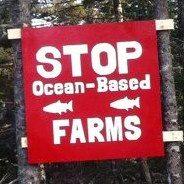You are here
The Eastern Shore needs to be ready to keep fish farms out of our harbours again!

The Provincial Government has granted Cermaq Canada (a subsidiary of the giant Norweign Fish farm company) four options to lease sites in the Chedabucto Bay and St. Mary's region for Marine based Fish Farms. BUT this is just the start. The company hopes to obtain about 20 salmon farm licenses in Nova Scotia.
Meanwhile Cooke Aquaculture also has plans to expand its’ operations in the province, not only in Liverpool Bay but they want to greatly up their capacity so as to open a processing plant (sound familiar and oh by the way where did that money go?) Cooke says it is responding to "open for business" signals from the Nova Scotia government. But has anything really changed since the moratorium on fish farms was enacted. I say NO!
The provincial government and Cooke Aquaculture say that Fish Farms can co-exist with our lucrative lobster fishery. They are relying on a study done by a scientist whose work is funded by Cooke Aquaculture and which took place on a new farm site in New
Brunswick. They have chosen to ignore a 2018 independent study published by Dalhousie University researchers that looked at how fish farms can affect lobster catches not whether lobsters are simply present. A presentation on the results was made at a recent Association for the Preservation of the Eastern Shore (APES) meeting.
The study was conducted in conjunction with the lobster fishers of Port Mouton, N.S. over an 11 year period.A fish farm has operated in their traditional lobster fishing territory for 20 years. During the first few years that the farm operated fishers observed that the lobsters were initially attracted to the feedlot, an observation that seems to be confirmed by the recent Cooke funded study. HOWEVER, after 2-3 years of the fish farm operating in their Bay, Port Mouton lobster fishers began abandoning their traditional fishing areas due to low catches. The 2018 study found that during the years that the Port Mouton fish farm was stocked, the catch of market sized lobsters decreased by 42% and the counts of berried lobsters (females) dropped by 56%. Lobster need good quality water and habitat and they are extremely sensitive to sulphide and ammonia levels in the water. These are produced in fish farm operations.
The Provincial Fisheries and Aquaculture minister Mr. Colwell says that our regulations are the best in the world. Our regulations say that when sulphide levels in the water around fish farms reach 3,000 micromoles that the action required is more monitoring. But at this level we lose 60-70% of the marine biodiversity. Does that sound sufficient? On the south shore 2 residents had to take the Provincial government and Cooke to court so that the information that they were entitled to under the law could be released. Does that sound like transparency? The industry in Nova Scotia is essentially self regulating. Do you believe our provincial regulators with their minimal inspection resources can stand up to these industrial giants that they are courting? Cooke and Cermaq have operated in B.C. and Washington. In B.C. Cermaq faced ongoing protests and in Washington Cooke’s lease was not renewed because of a major escape of fish. Is that why these companies are looking for more "company friendly" locations?
The provincial government is trying to shove this outmoded industry onto rural Nova Scotians again whether we want it or not. In a recent poll conducted in Nova Scotia 84% of people said they do not support marine based fish farms.
This industry doesn't even provide the jobs that they promise as it is becoming increasingly mechanized. The farmed salmon production in Nova Scotia has increased by 1,000 % from 1995 (1,120 metric tonnes produced) to 2017 (11,546 metric tonnes produced) and yet the the number of full time people employed is virtually the same with 100 full time jobs in 1995 and 108 full time jobs in 2017. Part time employment in this industry in the same period has dropped by 86%. These figures are from the Nova Scotia government website.
The provincial government has taken the position that they are opposed to more Marine Protected Areas in our province and that is because they believe that our coastlines need to be available for the development of fish farms and oil and gas.
It is important that no matter where people on the Eastern Shore stand on the ongoing discussions of a Marine Protected Area that we are not divided in our opposition to fish farms. We made this clear in 2012 and we will need to be united in our opposition today.
Wendy Watson Smith
President of the
Association for the Preservation of the Eastern Shore
Copyright APES 2012 Website by Ionsign Online

